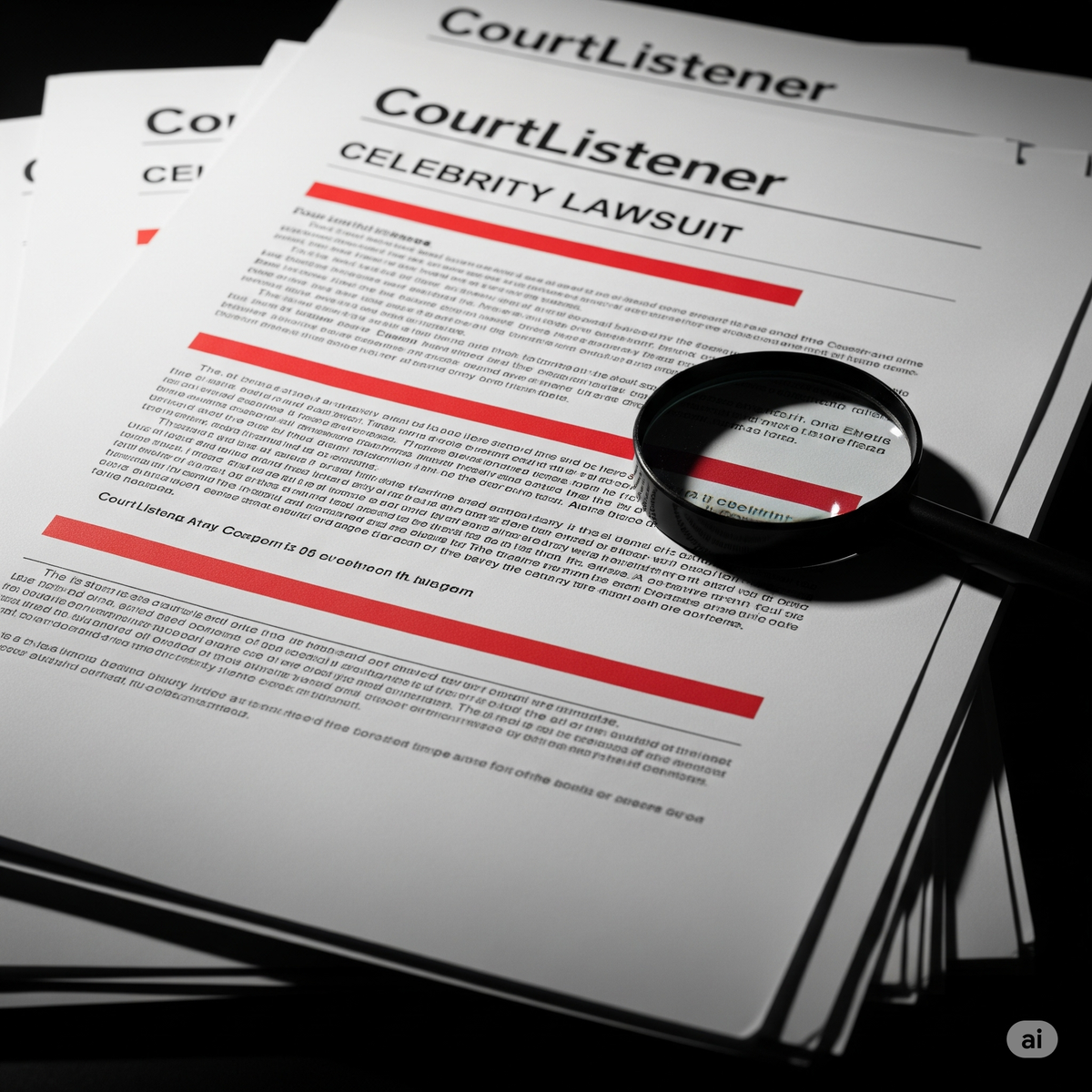The Lawsuits Celebrities Don't Want You to See: Digging Through CourtListener in 2025
What are Hollywood’s biggest secrets hiding in plain sight? Dive into CourtListener’s 2025 archives to uncover sealed filings, gag orders, and lawsuits celebrities hoped you'd never read. From defamation to NDAs the courtroom drama is real, and it's public.

Los Angeles, June 27, 2025
Celebrities have extensive dominion over their public persona in the current digital era regulating press, platforms, and perception. Behind closed courthouse doors, however, countless prominent legal melodramas occur off the radar, beneath the cover of sealed records and FOIA-screened filings. Due to websites such as CourtListener, Justia, and Archive.org, vigilant researchers can dig up salacious lawsuits that stars would rather keep hidden.
This in-depth look examines how CourtListener and similar resources bring attention to sealed or hidden celebrity cases in 2025 and why they're important.
Why Some Celebrity Lawsuits Remain Confidential
Celebrities commonly seal court documents to keep sensitive or humiliating information like medical records, personal correspondence, non‑disclosure agreements, or accusations that can damage reputation under wraps. Courts can authorize these precautions for the psychological safety of parties involved, privacy statutes, or to prevent biasing a jury.
But seals do have an end date, and legal systems do demand filings in public records even under seal. Tools such as CourtListener index these docket entries. Researchers can then press for FOIA requests, receive unredacted documents from public repositories, or access versions saved on Justia or Archive.org.
Such openness empowers journalists, attorneys, and privacy activists but raises ethical questions regarding exposé versus dignity.
Notable 2025 Cases Hidden in Plain Sight
1. Blake Lively v. Justin Baldoni / Wayfarer Studios
Summary. The lawsuit, filed late 2024, is based on Lively's sexual harassment allegations against director Justin Baldoni and Wayfarer Studios production company sealed for most of early 2025.
- CourtListener dockets 1:24‑cv‑10049 and 1:25‑cv‑00449 show extensive filings up to June 2025.(courtlistener.com)
- An Archive.org leaked amended complaint, as reported by Newsweek, outlines alleged harassment: unwanted comments, COVID exposure on the set, inappropriate touching, and privacy breaches during breastfeeding. (newsweek.com)
- Reuters and Page Six reported attempts by Lively’s team to seal private texts prompting counterclaims from Baldoni and cautions about media exploitation
What CourtListener reveals:
While sensitive exhibits remain under seal, CourtListener shows case chronology, sealed motions, and judge’s warnings about leaking scandalous filings
Why it matters:
This lawsuit highlights the balance between protecting privacy and exposing workplace misconduct in a high-stakes Hollywood environment.
2. Sean ‘Diddy’ Combs Sealed Indictment
Overview. A sealed federal grand jury indictment, presented in Southern District NY (Case 24 Cr.), accuses Sean Combs of racketeering conspiracy encompassing charges of sex trafficking, violence, forced labor, kidnapping, arson, and obstruction.
CourtListener's role:
Though the indictment is still sealed, CourtListener's docket indicates that the case is moving forward and does exist informing researchers of its existence.
Why it matters:
The case presents serious criminal charges—sex trafficking and organized violence. Disclosure would have a huge impact on public opinion and highlights how even sealed federal cases find their way to public docket systems eventually.
3. State of New York v. Donald J. Trump
Overview. S.D.N.Y.'s high-profile case, filed Feb. 7, 2025 (Case 1:25‑cv‑01144), concerns the New York State Attorney General's suit against former President Trump for alleged business fraud.
Sealed aspects:
Whereas most filings are available, particular discovery documents and affidavits are protected behind seals a reminder that political officials heavily utilize seal motions.
Why it matters:
In this case, even with high‑profile media attention, valuable legal content is consistently hidden harming complete transparency unless media gain CourtListener or FOIA.
How to Dig Deeper Using CourtListener & Justia
Here's how to dig deeper into sealed or lesser‑known celebrity lawsuits step‑by‑step:
- Begin with docket searches.
On CourtListener, search terms such as "Wayfarer Studios," "Sean Combs sealed indictment," or "Trump 1:25‑cv‑01144" produce docket entries containing seals, motions, and timelines
- Seek out docket metadata.
Even where documents are sealed, CourtListener data records number and filing date, pointing toward direction and magnitude of evidence.
- Cross-check Justia & Archive.org.
These websites tend to host unsealed exhibits or filings—as with Newsweek's archived PDF of Lively's complaint
- Employ FOIA requests.
When documents are seal-held by the court, FOIA to administrative bodies such as the California Civil Rights Dept may provide early-stage complaints or findings.
- Monitor media and official press releases.
Sources such as Reuters, ABC News, Yahoo!, or Page Six report new filings or motions every day use those to correlate docket numbers with public context.
- Watch Google Trends.
Observing spikes in celebrity lawsuits (e.g., "Blake Lively lawsuit") can identify when sealed documents receive notice perfect for focused searches.
Why Journalists & Legal Researchers Need to Care
- Exposing concealed truth. Sealed filings can expose workplace harassment, criminal activity, or attempts to manipulate reputation.
- Legal transparency. Seal orders obstruct public scrutiny. Sites like CourtListener push back against opacity by exposing docket activity—even sealed events.
- Privacy protection vs. public interest. Investigators should balance disclosing allegations with privacy rights, particularly where records are not judicially redacted.
Ethical & Legal Issues
- Is publishing sealed material ethical? Sharing unredacted documents can injure parties involved. It is argued that it disobeys court orders or confidentiality contracts.
- Are courts permitting sealed motions quietly? Yes but most utilize procedural devices such as protective orders for medical information or unnecessary communications.
- Should celebrities be accorded complete privacy? Courts do seal files, but advocates of transparency call for wider access, particularly where issues concern public trust.
What's Next in 2025?
- Major Trials Ahead:
The Blake Lively vs. Justin Baldoni case is set to go to trial next March 2026. Both sides, as of mid-2025, are still fighting about protective orders, attempting to determine what is and what is not to be made public. Primary sources such as Newsweek, Reuters, and Page Six verify the ongoing court wrangling over sealed witness statements and confidential communications.
In the meantime, the Sean 'Diddy' Combs federal case still sealed could soon be moving into its unsealing stage as pre-trial motions are being filed. Legal analysts expect pieces of the indictment or affidavits might become public by late 2025, pending DOJ strategy and media pressure.
- AI and Court Metadata:
Artificial intelligence is playing a crucial role in identifying sealed filings, reviewing patterns such as filing dates, motion types, and attorney names. This helps watchdogs identify suspicious or repressed lawsuits even when case information is redacted or not available.
- Increased Public Scrutiny:
As CourtListener's user base grows, journalists, law students, and individual researchers are now monitoring court dockets in real time. With increasing scrutiny placed on sealed filings, pressure is building on courts to explain what remains secret and for how long. The public's role in insisting on legal transparency continues only to grow in 2025.
Final Thoughts
CourtListener and its brethren are revolutionizing the way that sealed court records are discovered and interpreted. In 2025, secret celebrity lawsuits such as those filed by Blake Lively, Sean Combs, and Donald Trump show what stories dockets can contain quietly shaping public narrative long before trials start.
While privacy and legal ethics restrict how much is disclosed, these sites offer unprecented access to court metadata and sealed docket material, opening up new avenues of investigation provided that the researchers employ them judiciously.
Sources
- CourtListener – Free access to federal and state dockets, including sealed filings and metadata.
- Justia – Public legal documents and opinions, including user-archived PDFs.
- Archive.org – Archived versions of leaked filings (e.g., Newsweek PDF).
- Google Trends – Tracking search spikes (“Blake Lively lawsuit”, etc.).
- Official press releases – From legal teams or AG offices.
- Reputable news outlets – Reuters, Yahoo!, Newsweek, Page Six, ABC News.




